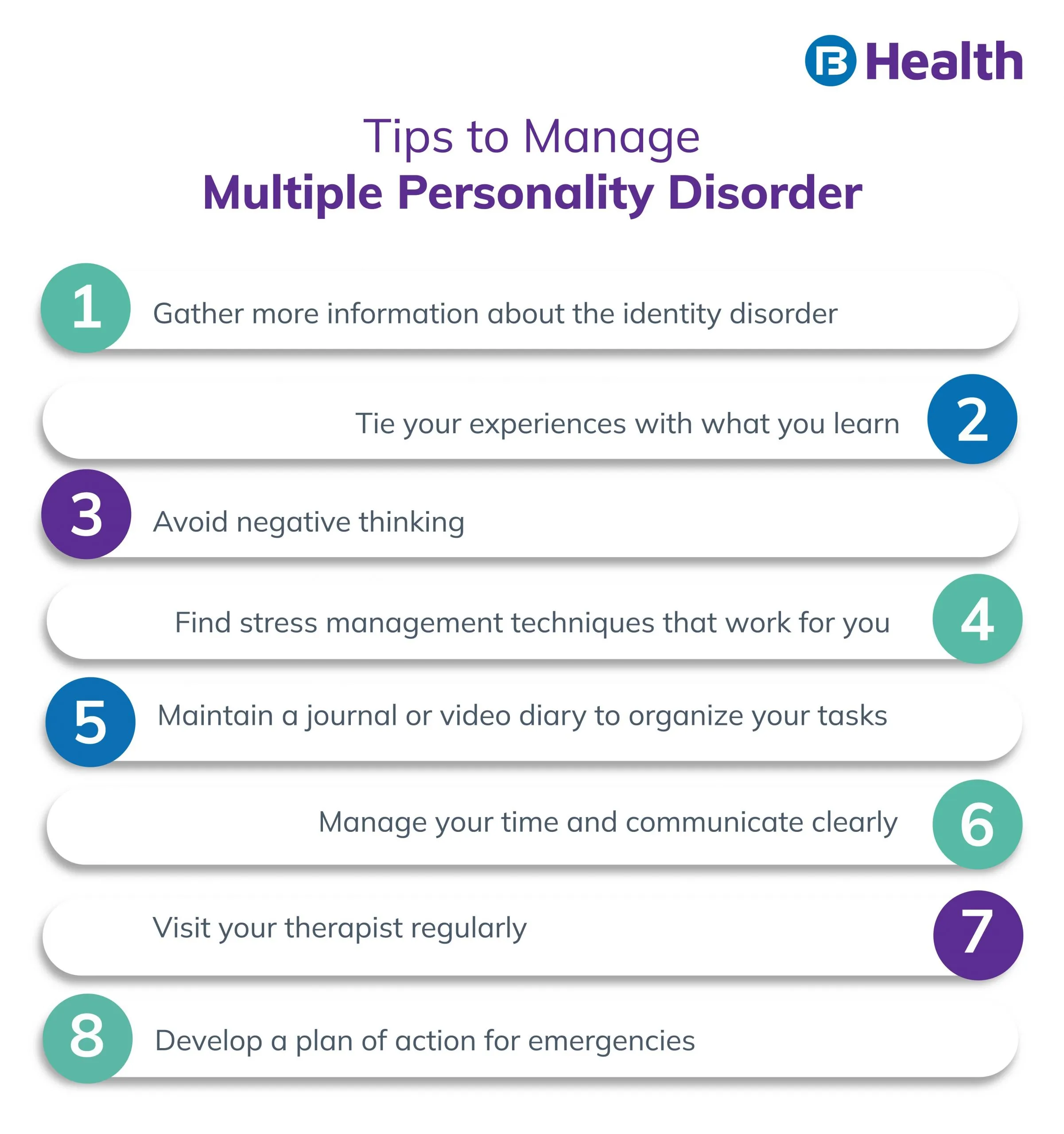Psychiatrist | 4 min read
Multiple Personality Disorder: 5 Points to Know About It
Medically reviewed by
Table of Content
Key Takeaways
- Multiple personality disorder is one of the various mental health disorders
- Headache and amnesia are common dissociative identity disorder symptoms
- Doctors use a psychology-based approach to treat split personality disorder
The effects of trauma, be it psychological, sexual, physical, or any other form, can have severe consequences. Among the most notable is multiple personality disorder, which is a very serious mental condition. Experts have found that there may be traumatic triggers associated with this condition. In fact, depending on the severity, it can completely alter your personality, wherein your thoughts or memories may no longer feel like your own. As such, such a condition must be addressed at the earliest possible.
To help you know more about dissociative identity disorder or split personality disorder, the common dissociative identity disorder symptoms, and more, read on.
What are multiple personalities or dissociative identity disorders?
Multiple personality disorder is one of the different types of dissociative disorders. It stems from trauma, which can occur during childhood, and the key symptom here is dissociation. If you are suffering from this identity disorder, you are likely to be less connected with key aspects of your mental state. This will include your memories, thoughts, actions, identity, and other such elements [1]. The dissociation is actually a response to trauma, wherein the afflicted try to distance themselves from experiencing further trauma.
Additional Read: Common Types of Mental Illnesses
How to recognize the symptoms associated with multiple personality disorder?
This mental health disorder has very easily identified symptoms. The most identifiable symptom is the presence of two different identities. In such cases, you will feel possessed by different people, each with their own opinions, and all of it occurs inside your head. The best way to tell if these personalities exist is to notice differences in each, such as their voice, manners, and inclination. In some cases, a physical manifestation may also take form, wherein one personality may require spectacles, but the other does not. Besides this, multiple personality disorder also increases the instances of amnesia, making it difficult to remember even the simplest things.
Do note that not everyone experiences dissociative identity disorder the same way, and symptoms could vary based on the different personalities that develop in individuals. Each personality under this identity disorder has different behavioral patterns and methods of portraying themselves. People suffering from this disorder may switch between personalities often, and these episodes can last a few seconds, minutes, hours, or even days, depending on the severity of the condition.
What are the other dissociative identity disorder symptoms?
Dissociative identity disorder symptoms may include:
- Time loss
- Trance-like states
- Headaches
- Amnesia or loss of memories, such as information, facts, and experiences
- Out-of-body experiences, which is a feeling of being detached from one's body and perceiving the world from a different location
- Derealization is a feeling that makes situations or things feel unreal, hazy, or distant [2]
What problems can multiple personality disorders cause?
Along with dissociative issues, individuals can encounter various other mental issues, including side effects like:
- Mood swings
- Anxiety
- Depression
- Thoughts of self-harm or suicide
- Panic attacks
- Trouble sleeping or sleep riddled with night terrors
- Rituals and compulsions
- Substance abuse
- Eating disorders
- Hallucinations
How can you treat multiple personality disorders?
Considering how unique the disorder is and the fact that it varies with each person, there are no formal, proof-based guidelines to treat multiple personality disorder. Doctors will often tailor treatment for this type of identity disorder. Such treatment methods include:
Adjunctive therapy
Treatment using art or movement therapy helps you connect with different parts of your mind. This method is useful in case individuals have shut down that part of their brain due to trauma.
Hypnotherapy
Clinical hypnotherapy is used to help access repressed memories and control problematic behaviors that accompany multiple personality disorders. It also helps integrate all the different personalities into one.
Psychotherapy
Doctors speak with patients suffering from dissociative identity disorder symptoms to get a clearer picture. The goal of this method is to establish triggers and find ways to control them.
While there are general prescription medicines that doctors use to decrease stress and anxiety associated with multiple personality disorder, psychology-based approaches are the pillar of treatment. Apart from this disease, there are various types of mental illnesses that therapy can heal, such as obsessive-compulsive disorder. In such cases, treatment takes place over a period of time, so patience and consistency are required [3].
Additional Read: Obsessive-compulsive DisorderThere are various types of mental illnesses, and while some may not be as serious as multiple personality disorders, they require identification and treatment. Make sure you get help if you are suffering from any kind of mental health disorder. Book a doctor appointment on Bajaj Finserv Health to talk to an expert if you notice any symptoms. You can also buy an Aarogya Care health insurance plan on Bajaj Finserv Health and make use of benefits like network discounts, pre-, and post-hospitalization coverage, preventive healthcare, OPD coverage, and more. With all these features to protect your health, you can march ahead towards a more fulfilled life.
References
- https://psychiatry.org/patients-families/dissociative-disorders/what-are-dissociative-disorders
- https://www.nami.org/About-Mental-Illness/Mental-Health-Conditions/Dissociative-Disorders
- https://www.sane.org/information-stories/facts-and-guides/dissociative-identity-disorder
Disclaimer
Please note that this article is solely meant for informational purposes and Bajaj Finserv Health Limited (“BFHL”) does not shoulder any responsibility of the views/advice/information expressed/given by the writer/reviewer/originator. This article should not be considered as a substitute for any medical advice, diagnosis or treatment. Always consult with your trusted physician/qualified healthcare professional to evaluate your medical condition. The above article has been reviewed by a qualified doctor and BFHL is not responsible for any damages for any information or services provided by any third party.




